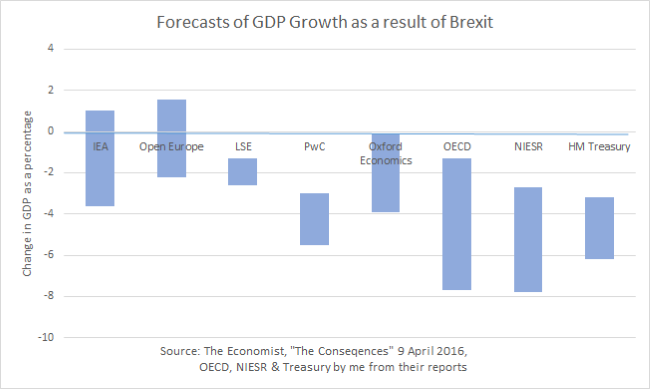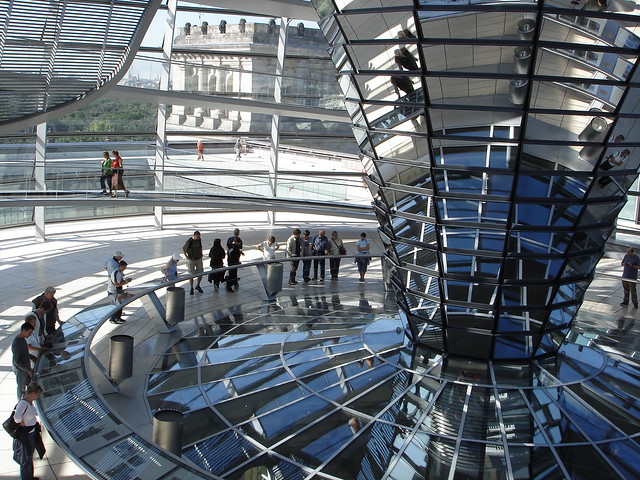On June 23rd, there will be the most important democratic decision taken in the UK, ever. The British People and those of Northern Ireland will be asked if they wish to remain in or leave the European Union. I am firmly of the view that both collectively and individually we will be better off, have more freedoms and a richer political, and non-political culture if we remain in. Like others, I have a list of issues that I believe need to be considered, mine are, Jobs & Prosperity, Citizenship Rights, Sovereignty and Peace & Hope.
Jobs & Prosperity
The economics is done. We are and will be better off in the EU, the alternatives are bad or terrible; it all depends upon the terms of exit from the EU. The Treasury categorises the options as similar to the Canadian agreement, the European Economic Area agreement or falling back on World Trade Organisation Terms. They estimate a reduction in GDP of between 3.2% and 7.2%. Other economic forecasters have a different set of ranges.

No-one thinks we’ll be better off!
Rights
Membership of the EU confers a number of rights on UK citizens. Leaving the Union will mean losing these as rights, or losing their legal guarantee. It’s one of the reasons that the Tories that want to leave, want to leave. These rights cover employment protection, including the right to organise, rights to holiday pay and maternity leave and pay, consumer rights, the right to work anywhere in the EU. These rights and their cost to business are what the brexiteers refer to as the bureaucratic regulatory burden; which they want to abolish. In addition, as citizens we have the right to live anywhere, and buy property anywhere in the EU. More importantly a number of citizenship or human rights: freedom of speech, right to organise, the right to an education, right to liberty, freedom from torture are guaranteed as part of the EU accession treaties. They may be more accessibly enforced via the ECHR and its court, but the strength of the guarantee to us as citizens by the EU treaties is stronger. These are in jeopardy should we leave.
Sovereignty
Much is made by both the right and left opponents of the EU of the issue of sovereignty. The UK is unique in not having a written constitution and not having a basic law. This means that Parliament, which in effect means the House of Commons, which in effect mean the majority party can legalise what it likes; no laws nor Judges can stop them. In the ‘80s, as the Tory’s fear of Labour grew, the Tory Lord Chancellor, Lord Hailsham, described the British constitution as an elective dictatorship. The dirty secret is that the arguments about sovereignty are based on defending the power of the Commons and its members. Leaving the EU will not make us as citizens any more powerful; in fact the loss of access to the EU courts, the loss of the ability to vote for our MEPs will enhance the power of the ruling elite in the UK at the expense of you and me, incidentally as does reducing the number of MPs from 650 to 600.
A more dramatic language is “Doing what Brussels tells us” or “Writing our own laws”. EU law is either about the single market or the interpretation of human rights. If we are to have a trade agreement with the EU then we’ll need to take the single market rules; if we leave we’ll still have the trade rules written in Brussels but have no votes on what they say. The Human Rights laws we should embrace; the true objection by the Tories is the establishment of a rights based constitution and basic law. Why would we as citizens not want that?
Hope & Peace
Why would we not want to be in a Union with the peoples of Europe, the French and their republicanism, their hints of post imperialism, and frankly their “je m’en fous”, the Germans and their commitment to democracy and the rule of law, together with the strongest anti-fascist laws in the world, the Spanish, the Portuguese and the Greeks with their experience of building democracies in the struggle against military dictatorships & fascism and the eastern Europeans in their struggles to build democracies in the shadow of Stalinism. In a speech I made the other day, I spoke about Memento Park in Budapest, the democracy exhibition at the top of the Bundestag building, the other three workers revolts in Eastern Europe and the French enforcement of the working hours directive.

I’d like to develop 27 stories; I have no doubt that they’re there. Also programmes like Erasmus which allow the young of Europe to study with each other are key to a peaceful & secure Europe, more so than common security policies, an EU army, and the building of a “democratic” police state. Europe is stronger together, and both Britain and Europe will benefit from Britain’s membership; Britain will benefit more if it approaches the Union with some humility. We have important lessons to learn from the rest of the peoples of Europe.
ooOOOoo
A word to those on the Left, who argue that the EU treaties embed neo-liberalism and austerity. The counter arguments are the social chapter and the fact that inside the EU, there’s a chance to reject TTIP, the EU Parliament rejected its predecessor, ACTA, led by a Labour MEP and it’s more likely to do so with the UK’s 80 MEPs. Outside we have no influence! Another important indicator is the fines issued to Microsoft, Intel and potentially Google. The EU is capable of regulating multi-national capitalism, the British State has neither the power nor the will to do so. When it comes to regulation, the EU is the only game in town. Furthermore, thinking that the UK is or can be more powerfully inclined to opposing austerity is delusional. Thinking that Leave will damage the Tories more than Remain is equally so.
As it becomes clearer that there are no economic benefits to leaving, the Brexiteers are doubling down on what they think is their ace in the hole, Immigration. On Immigration, while we have a treaty obligation to allow other EU citizens to come to the UK to work, immigration is based on aggregate demand. Mainly high skilled workers are coming, and they’re net contributors to the economy. Given what’s been said about the terms of exit, it’s unlikely that we’ll negotiate away freedom of movement to work, the Norwegians and Swiss haven’t. It’s unlikely that we will reduce the amount of immigration, and it’s undesirable that we do. The answers to the non-racist arguments against immigration are to build more schools and homes, so they’re available to all, reduce tuition fees to give people the start and refresh they need to work, implement a minimum wage, reset the balance of power between unions and employers and make life long skills and education more accessible. The counter argument to the racists is obvious. “Oi! You. No!”
ooOOOoo
On immigration, jobs via outsourcing can be moved to low wage/low protection jurisdictions. Capital can take the jobs to them, rather than bring the workers to the jobs. There are some service jobs for which this is impossible.
On immigration, given that we are unlikely to negotiate away the free movement of labour, we might be put in the position that EU workers can come to the UK to work, but Britons can’t go to the EU to study, or retire, or even go on holiday without a visa.
Pingback:Is Brexit worse than expected? – davelevy.info
Pingback:Pipe dream or inevitability – davelevy.info
Pingback:Brexit and GDP – davelevy . info / wiki